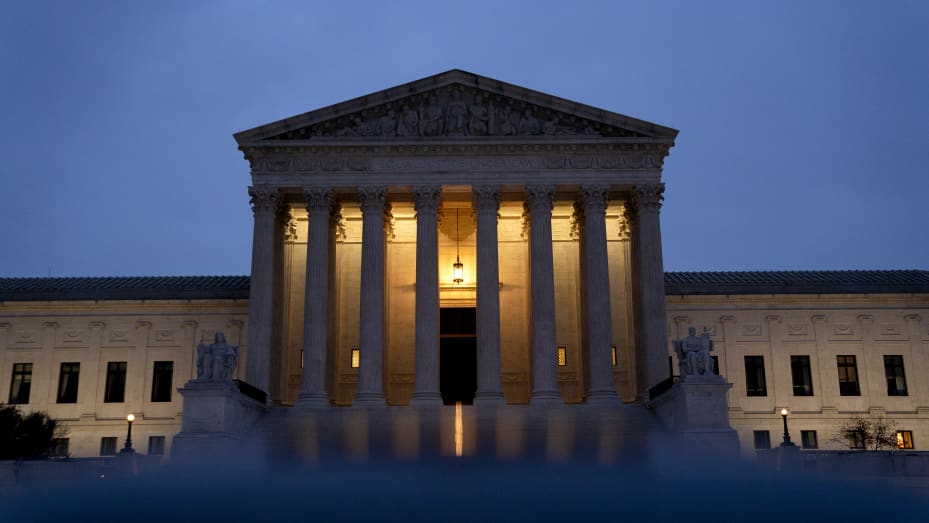How the Supreme Court could soon change free speech on the internet
![]()
How the Supreme Court could soon change free speech on the internet
PUBLISHED MON, JAN 30 20238:36 AM ESTUPDATED 38 MIN AGO

SHAREShare Article via FacebookShare Article via TwitterShare Article via LinkedInShare Article via Email
KEY POINTS
- The U.S. justice system, including the Supreme Court, will consider cases that will help determine the bounds of free expression on the internet.
- Section 230 of the Communications Decency Act has been a bedrock of the tech industry for more than two decades.
- But while industry leaders say Section 230 has allowed online platforms to flourish and innovate, lawmakers on both sides of the aisle have increasingly pushed to diminish its protections for the multibillion-dollar companies.
In this article
Follow your favorite stocksCREATE FREE ACCOUNT

Bloomberg Creative | Bloomberg Creative Photos | Getty Images
When Elon Musk announced his offer to buy Twitter for more than $40 billion, he told the public his vision for the social media site was to make sure it’s “an inclusive arena for free speech.”
Musk’s actions since closing the deal last year have illuminated how he sees the balance internet platforms must strike in protecting free expression versus user safety. While he’s lifted restrictions on many previously suspended accounts including former President Donald Trump’s, he’s also placed new limitations on journalists’ and others’ accounts for posting publicly available flight information that he equated to doxxing.
The saga of Musk’s Twitter takeover has underscored the complexity of determining what speech is truly protected. That question is particularly difficult when it comes to online platforms, which create policies that impact wide swaths of users from different cultures and legal systems across the world.
This year, the U.S. justice system, including the Supreme Court, will take on cases that will help determine the bounds of free expression on the internet in ways that could force the hand of Musk and other platform owners who determine what messages get distributed widely.
The boundaries they will consider include the extent of platforms’ responsibility to remove terrorist content and prevent their algorithms from promoting it, whether social media sites can take down messaging on the basis of viewpoint and whether the government can impose online safety standards that some civil society groups fear could lead to important resources and messages being stifled to avoid legal liability.
“The question of free speech is always more complicated than it looks,” said David Brody, managing attorney of the Digital Justice Initiative at the Lawyers’ Committee for Civil Rights Under the Law. “There’s a freedom to speak freely. But there’s also the freedom to be free from harassment, to be free from discrimination.”
Brody said whenever the parameters of content moderation get tweaked, people need to consider “whose speech gets silenced when that dial gets turned? Whose speech gets silenced because they are too fearful to speak out in the new environment that is created?”
Tech’s liability shield under threat

Facebook’s new rebrand logo Meta is seen on smartpone in front of displayed logo of Facebook, Messenger, Intagram, Whatsapp and Oculus in this illustration picture taken October 28, 2021.
Dado Ruvic | Reuters
Section 230 of the Communications Decency Act has been a bedrock of the tech industry for more than two decades. The law grants a liability shield to internet platforms




















